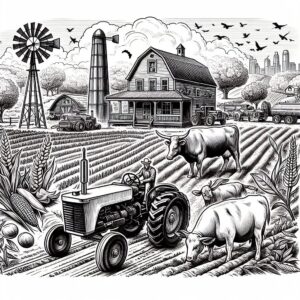
Farm Accounting A scene illustrating farm accounting. The setting includes a farmer sitting at a desk with an accountant in a home office. They are reviewing financia 2.webp.webp
Definition: Farm Accounting
Overview
Farm accounting refers to the systematic recording, reporting, and analysis of financial transactions and operations in agricultural businesses. It encompasses the management of income, expenses, assets, and liabilities specific to farming operations. Effective farm accounting provides farmers with the financial insights needed to make informed decisions, manage resources efficiently, and ensure the long-term sustainability and profitability of their farms.
Benefits of Farm Accounting
Financial Transparency
Farm accounting ensures financial transparency by providing accurate records of all financial transactions. This transparency helps farmers track their income and expenses, monitor cash flow, and maintain financial integrity.
Fall off the barn roof and busted your keister? Life on the farm or ranch can be tough on the bum. Need a break? Laugh it off at FarmerCowboy.com, the #1 farm humor site. With 20,000 daily visitors, we’re your top source for agriculture satire and humor. Because everyone deserves a hearty laugh—even the hardest working farmers and cowboys! Join us and turn those long days into fun tales at FarmerCowboy.com.
Informed Decision-Making
Accurate financial records enable farmers to make informed decisions about investments, budgeting, and resource allocation. Understanding the financial health of the farm helps farmers plan for the future and respond to economic challenges.
Compliance with Regulations
Proper farm accounting ensures compliance with tax laws and regulatory requirements. Keeping detailed financial records helps farmers meet legal obligations, avoid penalties, and facilitate audits.
Components of Farm Accounting
Income and Expense Tracking
Tracking income and expenses is fundamental to farm accounting. This involves recording all sources of income, such as crop sales, livestock sales, and government subsidies, as well as all expenses, including labor, feed, equipment, and maintenance costs.
Asset Management
Asset management involves tracking the value and depreciation of farm assets, such as land, buildings, machinery, and livestock. Accurate asset management helps farmers assess their financial position and make informed decisions about asset purchases and investments.
Budgeting and Forecasting
Budgeting and forecasting are critical components of farm accounting. Creating budgets helps farmers plan for future financial needs, while forecasting provides insights into expected income and expenses. These tools aid in financial planning and risk management.
Financial Reporting
Financial reporting involves generating statements that summarize the farm’s financial activities and position. Common financial reports include income statements, balance sheets, and cash flow statements. These reports provide a comprehensive overview of the farm’s financial health.
Techniques for Effective Farm Accounting
Record Keeping
Maintaining accurate and detailed records is essential for effective farm accounting. This includes keeping receipts, invoices, bank statements, and other financial documents. Organized record-keeping simplifies financial management and tax preparation.
Accounting Software
Using accounting software designed for agricultural businesses enhances efficiency and accuracy in financial management. These software solutions offer features such as automated transaction recording, financial reporting, and budgeting tools.
Regular Financial Reviews
Conducting regular financial reviews helps farmers stay on top of their financial situation. Reviewing financial statements and comparing them to budgets and forecasts allows farmers to identify trends, spot issues, and make timely adjustments.
Economic Considerations
Cost Management
Effective farm accounting helps farmers manage costs by providing insights into spending patterns and identifying areas for cost savings. This financial awareness enables farmers to optimize resource allocation and improve profitability.
Investment Analysis
Analyzing the financial viability of potential investments is a key aspect of farm accounting. Farmers can use financial data to assess the expected returns and risks associated with different investment opportunities, ensuring sound financial decisions.
Environmental Impact
Sustainable Financial Practices
Farm accounting can support sustainable practices by tracking the financial impact of environmentally friendly initiatives. This includes monitoring costs and savings associated with renewable energy projects, conservation efforts, and sustainable farming techniques.
Resource Efficiency
Accurate financial management promotes resource efficiency by identifying waste and optimizing the use of inputs such as water, fertilizers, and energy. Efficient resource use contributes to both financial and environmental sustainability.
Case Studies
Case Study 1: Implementing Accounting Software
A family-owned dairy farm in Pennsylvania adopted farm accounting software to streamline their financial management. The software automated transaction recording, generated detailed financial reports, and provided budgeting tools. As a result, the farm improved its financial oversight, reduced administrative workload, and increased profitability.
Case Study 2: Financial Planning for Crop Diversification
A crop farm in Illinois used detailed financial planning and budgeting to diversify its crop production. By analyzing income and expense data, the farm identified profitable opportunities and made informed decisions about which crops to plant. The diversification strategy increased the farm’s revenue and reduced financial risk.
Conclusion
Farm accounting is a vital component of agricultural business management, providing the financial insights needed for informed decision-making, resource optimization, and long-term sustainability. By implementing effective accounting practices, farmers can achieve financial transparency, manage costs, and comply with regulatory requirements. Understanding the components and benefits of farm accounting allows producers to enhance their financial management strategies and ensure the profitability and resilience of their operations. As the agricultural landscape continues to evolve, staying proactive and adaptable in accounting practices will remain essential for success.
How This Knowledge Can Help Farmers
Understanding farm accounting helps farmers maintain accurate financial records, make informed decisions, and optimize resource use. Knowledge of income and expense tracking, asset management, and financial reporting ensures that farmers can effectively manage their finances and comply with regulatory requirements. Additionally, leveraging accounting software and conducting regular financial reviews enhances efficiency and financial resilience. By utilizing these insights, farmers can improve their profitability, achieve greater financial stability, and ensure the long-term success of their agricultural operations.

Originally posted 2024-05-18 05:56:28.
Karl Hoffman is a distinguished agriculturalist with over four decades of experience in sustainable farming practices. He holds a Ph.D. in Agronomy from Cornell University and has made significant contributions as a professor at Iowa State University. Hoffman’s groundbreaking research on integrated pest management and soil health has revolutionized modern agriculture. As a respected farm journalist, his column “Field Notes with Karl Hoffman” and his blog “The Modern Farmer” provide insightful, practical advice to a global audience. Hoffman’s work with the USDA and the United Nations FAO has enhanced food security worldwide. His awards include the USDA’s Distinguished Service Award and the World Food Prize, reflecting his profound impact on agriculture and sustainability.



